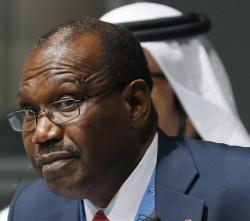The latest battle over who governs the Internet is taking place right now. Representatives from more than 150 nations gathered in Dubai last Monday for the World Conference on International Telecommunications, a two-week meeting hosted by the International Telecommunication Union, a specialized agency of the United Nations. Their mission: to renegotiate International Telecommunications Regulations treaty, which governs global interconnection and interoperability of telecommunications traffic. The outcome could change how the Internet works.
The United States and a number of countries in Europe, Latin America, and Asia-Pacific want to keep Internet governance out of international treaties, while others—namely, Russia, China, and Saudi Arabia—are pushing to extend governmental control over the Internet. Caught in between are countries that face real challenges to truly reap the benefits of the Internet due to issues of access and affordability, particularly in Africa.
Right now, we’re just past the halfway point of the conference. The first week had a few surprises but little indication what the outcome on Dec. 14 will actually look like.
As a concession to calls for greater transparency, the sessions of the review committee and plenary meetings were opened to the public on the first day of the conference—except that the timing of that decision left little time for civil society groups to actually attend, apart from those few who had already (and optimistically) planned to travel to Dubai.
Perhaps most importantly, the key issue of whether the new treaty text will include the Internet at all still has not been resolved. In essence, this debate hinges on a single edit that could expand the scope of the treaty significantly from governing national regulatory agencies and former state monopolies to millions of private companies operating networks. The United States and a number of allies oppose expanding this and other definitional changes that would have a similar effect, whereas Russia and others support it.
Over the weekend, it became clear that this question remains contentious when a controversial new proposal for discussion by the United Arab Emirates, Russia, China, Saudi Arabia, and other nations was leaked. Among other things, it would involve subjecting the decentralized Internet governance system to far greater control by national governments. Despite the fact that it had little prospect of garnering consensus approval, the text indicated that a number of countries are still pushing for sweeping changes in the treaty. While this proposal is apparently no longer on the table after an intervention by the ITU secretary-general himself, several of its most contentious elements are still being discussed. They include references to cyber-security and spam, issues that Western governments want to keep out of the ITR out of concern that such provisions are backdoors to content control and government censorship.
Moreover, Russia has pushed to shift control over the address system to an intergovernmental organization and argued that governments should know how Internet traffic is routed. By expanding governmental control and imposing the concept of national borders on Internet traffic, it would make it easier for governments to restrict human rights.
Also unresolved are some important economic issues. Perhaps the most potentially game-changing aspect here involves language that would replace the end-to-end principle (where network operators agree to carry all traffic from its origin to destination without discrimination) with a “sender-pays” system. (You may remember similar issues coming up in the United States during the net neutrality debates.) Right now, network owners generally exchange data with one another for free and get their revenue from charging end-users for the provision of Internet service. But replacing this with a “pay-to-play” system would mean that network operators and possibly event content providers like Netflix would have to pay fees to send their data over other networks. This could increase cost to consumers and create additional barriers for smaller businesses and nonprofits, particularly in developing countries.
In short, the passage of the first week has mostly revealed that there is still too big a gap for negotiators to reach consensus. It looks like many negotiation sessions will extend well beyond prime-time, toward the end of the second week.
Independent of the outcome at WCIT, it is already clear that the current governance system faces significant challenges how to ensure it will remain accepted by Internet users worldwide. WCIT is an opportunity to use the momentum to develop a long-term, positive strategy that outlines how existing institutions in the multi-stakeholder system can be scaled up or improved to represent Internet users all over the world and give ample opportunity for them to participate and make their voices heard.
For more information, read “What’s at Stake at WCIT?” from the New America Foundation’s Open Technology Institute.
